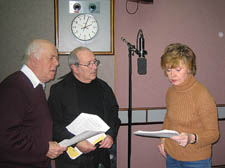|
|
 |
| |

The playwtight (center) and Prunella Scales recording the Rocking Horse |
Suddenly Wesker’s on the up – again
As he celebrates his 76th year Sir Arnold marks a BBC World Service’s anniversary – and tells Gerald Isaaman about the
challenge of his very first opera
Playwright Sir Arnold Wesker, who in 1964 inspired the original Centre 42 arts centre at the Round House, Chalk Farm, and lived up in Highgate for decades, is undergoing a remarkable renaissance – at the age of 75.
He has been spurned too long in his own country after making a huge reputation abroad, but, he has a host of work on, including a trip to Japan, to mark his debut in creating and directing a one-woman opera.
“My first opera – a terrifying prospect but one I couldn’t resist,” he exclaims.
“Some years ago a wonderful Japanese composer named Shigeaki Saegusa commissioned the libretto from me. The brief was that it had to be based on an incident that happened in the 1920s.
“So it is about a group of young Japanese officers who rebelled against the drift away from Japanese traditional life to today’s industrial society. They thought they had the Emperor on their side against the power of some of his opportunistic ministers. But he betrayed them and they were executed.
“Grief, the name of the opera, is about the wife of one of the officers whose dilemma is between the life force within her that wants to live, and the loyal wife who wants to defend her newly wedded husband’s honour by committing suicide.”
Meanwhile, the new radio play that he was commissioned to write to mark the 75th anniversary of the BBC World Service, called The Rocking Horse was broadcast on Sunday, starring Prunella Scales and Clive Swift.
“The BBC World Service thought that as it was also my 75th year that I should write the play to help them celebrate,” Sir Arnold tells me. “At first it was a contract for a 60-minute play, but as I ran overtime – and they liked it and as it was my 75th too – they agreed to extend it to a 75-minute play.
“That’s something unheard of I think for the World Service. I was brought up on radio, which is where I encountered most of my dramatic experience. So it was a joy as well as an honour to be asked to write for such an occasion.”
The play tells of a group of strangers drawn into an unlikely friendship over a shared interest in a rocking horse they see while on a bus – and the owners of the rocking horse who are grieving the death of their son in a road crash. “It’s about loss and recovery and has these two parallel stories running through it which come together in the end,” adds the playwright.
He is also awaiting the West End production of his latest play, which is called Groupie, and the publication by the Flambard Press of his first collection of poetry, All Things Tire of Themselves. Oberon Press are bringing out two new volumes of Wesker’s Love Plays and Wesker’s Monologues.
And on top of that Roots, the play that earned him his first international fame almost half a century ago, is being revived at the Royal Exchange, Manchester, in February.
He flies out to Tokyo on December 13 for his first meeting with the opera’s technical team. “Should I be doing this in my 76th year?” he asks himself ruefully, but admirers of Wesker’s work over the generations will no doubt applaud his continued success.
* |

|
 |
|
 |
|

